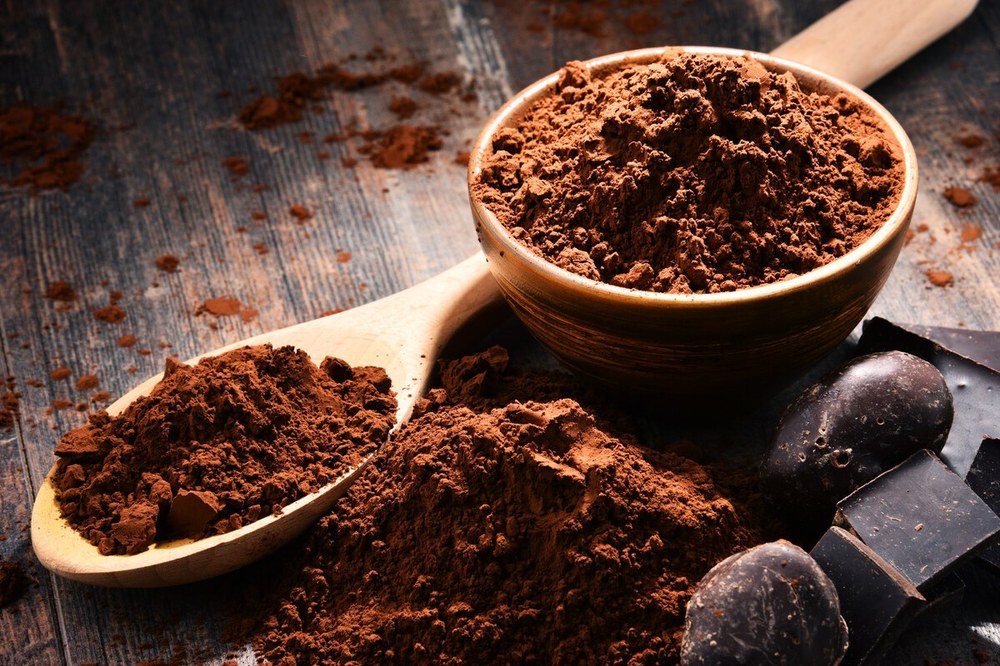Substituting dietary cocoa powder for high- calorie snacks may provide positive health implications for people.

Photo: Adobe Stock
Problem
Can dietary interventions help to reduce increasingly common chronic diseases?
- Nonalcohol-related fatty liver disease affects about one-quarter of the U.S. population, and can occasionally progress into severe diseases, such as cirrhosis of the liver. The cause of the disease is commonly associated with human obesity.
Findings
For this study, researchers examined changes in fatty liver disease, markers of oxidative stress, antioxidant response, and cell damage in high-fat-fed obese mice treated with a diet supplemented with cocoa powder.
- The scientists reported that cocoa-treated mice gained weight at a 21 percent lower rate and had smaller spleen weights—indicating less inflammation—than the high-fat-fed control mice. At the end of the study, mice fed the cocoa-powder-supplemented diet had 28 percent less fat in their livers than the control mice.
Impact
Given the high proportion of people in the U.S. and other parts of the world with obesity, there is a need to develop potentially effective dietary interventions rather than just preventive agents for conditions like fatty liver disease, which often develop without causing any symptoms.
- While the mechanisms by which cocoa imparts health benefits are not well understood, this study and others show that extracts from cocoa and some of the chemicals in cocoa powder can inhibit the enzymes that are responsible for digesting dietary fats and carbohydrates.
Research Credit
Team
- Mingyao Sun, Yeyi Gu, Shannon Glisana, Joshua Lambert
Participating Department
Competitive Funding
- NIH (National Center for Complementary & Integrative Health)
- USDA NIFA (AFRI)
Federal and State Appropriations
- USDA NIFA Hatch Project PEN04708, Accession #1019852
Emerging Discoveries
Published Research
Effect of processing on the anti-inflammatory efficacy of cocoa in a high fat diet-induced mouse model of obesity
-
Weikart, D. K., Indukuri, V. V., Racine, K. C., Coleman, K. M., Kovac, J., Cockburn, D. W., Hopfer, H., Neilson, A. P., & Lambert, J. D. (2022). Effect of processing on the anti-inflammatory efficacy of cocoa in a high fat diet-induced mouse model of obesity. Journal of Nutritional Biochemistry, 109, [109117]. https://doi.org/10.1016/j.jnutbio.2022.109117
Dietary cocoa ameliorates non-alcoholic fatty liver disease and increases markers of antioxidant response and mitochondrial biogenesis in high fat-fed mice
-
Sun, M., Gu, Y., Glisan, S. L., & Lambert, J. D. (2021). Dietary cocoa ameliorates non-alcoholic fatty liver disease and increases markers of antioxidant response and mitochondrial biogenesis in high fat-fed mice. The Journal of Nutritional Biochemistry, 92, 108618. https://doi.org/10.1016/j.jnutbio.2021.108618
Office for Research and Graduate Education
Address
217 Agricultural Administration BuildingUniversity Park, PA 16802-2600
- Email agresearch@psu.edu
- Office 814-865-3136
Office for Research and Graduate Education
Address
217 Agricultural Administration BuildingUniversity Park, PA 16802-2600
- Email agresearch@psu.edu
- Office 814-865-3136


